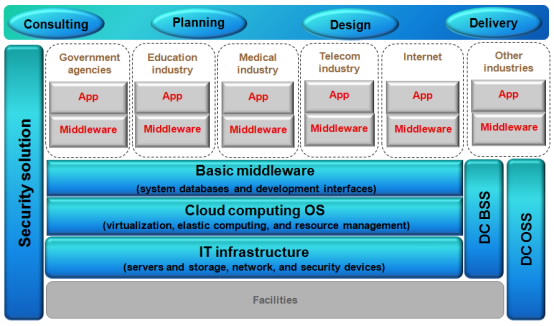
Advantages of the framework
IDC Cloud solution mainly consists of these advantages as below:
- Carrier class network design solution. The solution benefits from Huawei's CT experience and technology accumulated in the past, also by using advanced network design method, technology, product, ensuring IDC network framework is able to meet long term business development.
- Mature cloud computing design solution. Could computing platform design adopted Huawei self-developed virtualization product, based on good project management experience, developed it by following Huawei IPD process, which guarantees advanced and reliable nature.
- Advanced carrier-class management solution. The solution design covers network unit management, network management, cloud platform resource management and full-scale management system developed through cooperation with leading partners in the field, which meets requirements of mass IDC management, eventually evolving complete IDC management system.
Traditional IDC operators mainly provide services, e.g., physical host lease, storage lease, physical server hosting and server room lease. The services of different IDC operators are overlapping gradually. Operators are facing profit challenge contributed by a few factors, such as low utilization rate of computer resource, limited server room space and high electricity consumption. Cloud computing will be applied in the field of IDC widely, which is an important trend of IDC development.
Cloud technology not only can significantly improve utilization rate of IDC, but also greatly enrich traditional business structure of it. By relying on new business introduced by cloud technology, (e.g., virtual DC lease, virtual host lease and etc.) IDC operators can expect a new business, to improve profitability. By far, IDC traditional business and cloud business are being combined closely, which is a typical characteristic of IDC business needs.
IDC business needs include traditional typical business and services:
- Host service: Provide server/host lease.
- Storage service: Satisfy mass storage need.
- Network service: Provide network connection and guarantee/maintenance service.
- Security service: Provide security control service.
- Database service: Provide file system, database management service.
Meanwhile, according to trends of customer needs, IDC also focus on development of cloud computing business and service, by combining traditional business and service closely, provide customer with cost-effective business and services:
- Virtual host. Provide virtual computer resource lease
- Virtual storage. Provide online storage service
- Virtual network. Provide network connection based on network virtualization
- Migration of database to cloud platform. Provide database migration to cloud and deployment on cloud.
All the IDC business and cloud new business provide customer with diversified combinations of services, according to concrete needs and flexible configuration.
Meanwhile, It became a typical requirement that IDC operators provide private cloud business for governments and enterprises. They build their DCs within IDCs, taking up partial IDC resource solely.
Depending on cloud platform, to build IDC of low energy consumption, high revenue, automation, providing business profit opportunities and customized, professional services.
- Develop service categories: cloud computing is based on plug and play technology framework, which lowers configuration complexity and shortens rollout cycle by 80%. It also provides IaaS, PaaS and SaaS respectively through cloud platform. In subdivided markets, it provides load balance, data backup, data analysis, business migration and other professional services.
- Promote profitability: Higher operation efficiency, lower energy consumption, high resource utilization rate and greatly increase ROI. Divide markets into smaller segments, providing load balance, data backup, data analysis and other high value added customized services. Build open, professional industry eco-system, building interest alliance, to resist risks together.
- Optimized resource usage: Could dynamic infrastructure, through virtualization, make resource pools of IDC servers, storage, network and other resources, which enable elastic expansion, dynamic adjustment, hence improving resource utilization rate. Unified operation platform manages privileges and domains respectively and efficiently.
- Low energy consumption: Cloud virtualization technology, make sharing of hardware resource in the pool possible and easy, improving hardware utilization rate, lower energy consumption. Resource management platform enables IT infrastructure and facilities to work seamlessly together by making use of integrated resource planning, load balancing, distributed power management and etc technologies.

